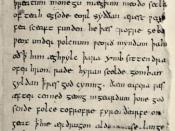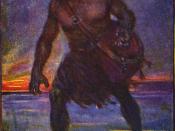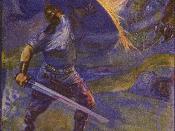On my count men, Charge! That is what you might have heard from your commander, or King, right before you charged into battle. Throughout history every culture has experienced one form of battle or another. Battle's bring out the best in men, and the worst in men. They bring out the courageous of men, and show the cowards running to the hills or the tree line for cover. Beowulf, The Wanderer, and The battle of Maldon portray both courage and coward ness in men.
Beowulf is an amazing tale of one man's courageous deeds and adventurous tales encountering sea beast, ferocious monsters, and fire breathing dragons. Throughout the epic poem much courage is shown from all sides of the battle. The first act of courage is one that is not easily seen. Grendel portrays the first act of courage, "When night descended he went to seek out the high house, to see how the Ring-Danes had bedded down after their beer-drinking.
He found therein a troop of nobles asleep after the feast; they knew no sorrow or human misery. The unholy creature, grim and ravenous, was ready at once, ruthless and cruel, and took from their rest thirty thanes, thence he went rejoicing in his booty,"(Beowulf l. 115-124). This may not seem like every day courage, but from his point of view he was jealous, stricken with rage. He wanted what they had, but would never have it. It was an audacious act to travel into the enemy's lair, with nothing but your own wits, even if you are out numbered. The next act of courage is told from Beowulf himself, "...I should, lord Hrothgar, seek you out, because they knew the might of my strength; they themselves had seen me, bloodstained from battle, come from the fight,


